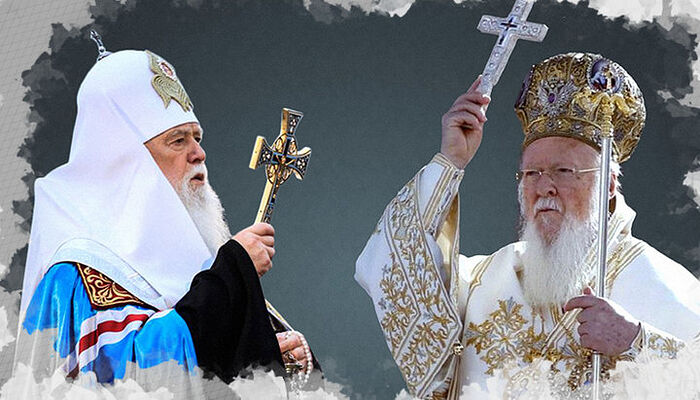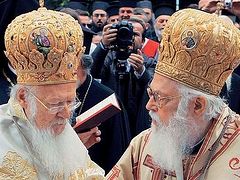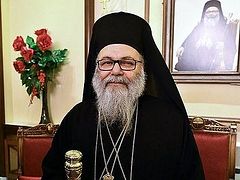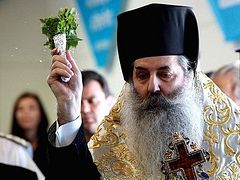Kiev, October 22, 2020
Patriarch Bartholomew of Constantinople was ready to “settle the Ukrainian Church problem” back in 2008, and the schismatic “Kiev Patriarchate” (KP) was ready to become an autonomous Church within the Patriarchate of Constantinople, according to an appeal from the hierarchs of the KP to the Patriarch at that time.
The document was published yesterday by Alexander Drabinko, one of the two bishops who left the Orthodox Church to join the schismatic “Orthodox Church of Ukraine” (OCU) at the “unification council” in December 2018, on his personal Facebook page, reports the Union of Orthodox Journalists.
The KP united with the “Ukrainian Autocephalous Orthodox Church” in December 2018 to form the OCU after then-President Petro Poroshenko appealed to Pat. Bartholomew, though the bishops of Philaret Denisenko’s KP were already negotiating with Constantinople at least a decade prior.
In the 8-page document, the KP expresses its “special gratitude” to Pat. Bartholomew “for his readiness to take an active part in resolving the problems of the Church division in Ukraine,” as attested to in the Patriarch’s letters to then-President Viktor Yushchenko.
The document also states that Pat. Bartholomew has a “deep understanding of the Ukrainian Church problem” and manifests “archpastoral wisdom in the question of granting autocephaly.”
In a comment on Drabinko’s post, Evstraty Zorya, a hierarch of the KP who joined the OCU, states that the majority of the document “was not written in Kiev.”
The hierarchs of the KP acknowledge that before autocephaly can be granted, “the Ecumenical Patriarch must conduct canonical research and consultations with the Patriarchal thrones of the East and the other Local Churches.”
When Constantinople eventually created the OCU and granted it autocephaly in 2018 and 2019, hierarchs and Synods from throughout the Orthodox Church objected, in part, because Constantinople had acted unilaterally. In the summer of 2018, a delegation from the Patriarchate of Constantinople visited the Local Churches of the Orthodox Church to inform them of the decision it had already made to grant autocephaly in Ukraine. After the OCU was created, Pat. Bartholomew then issued letters to all of the Orthodox primates, calling on them to recognize the OCU, though only Patriarch Theodoros of Alexandria and Archbishop Ieronymos of Greece eventually recognized the OCU, months later.
“Therefore, at a transitional stage,” the KP hierarchs write in the 2008 document, “until the Orthodox Church in Ukraine achieves unity and is granted a Patriarchal tomos on granting autocephaly, we humbly ask Your Holiness to accept us into communion with the Ecumenical throne as a metropolis with broad rights of autonomy,” the appeal reads.
Although representatives of Constantinople and the OCU have proclaimed the unity of the three branches of Ukrainian Orthodoxy, only 2 bishops of the canonical UOC, the largest Orthodox body in Ukraine, joined the OCU. The canonical UOC has since grown to more than 100 bishops and remains the largest Church in Ukraine.
The document also contains points according to which, in the case of receiving a tomos of autocephaly, the hierarchs of the KP agree to receive Chrism from the Patriarchate of Constantinople, to leave the issue of receiving clerics of the KP at the Patriarchate’s discretion, and to transfer all parishes outside of Ukraine to the jurisdiction of the Patriarchate.
The issue of the Chrism and parishes outside of Ukraine caused Philaret Denisenko to eventually reject the tomos granted to the OCU in January 2019 and revive his KP, arguing that the OCU is autocephalous in name only, while functionally operating as part of Constantinople.
The KP hierarchs also entreat the Patriarchate to lift the anathema imposed upon Philaret Denisenko by the Russian Orthodox Church. Philaret was formerly the canonical Metropolitan of Kiev in the Ukrainian Exarchate of the Russian Orthodox Church, but was defrocked, excommunicated, and anathematized in the 1990s for persisting in his schism.
Recall that in 1992 and 1997, Pat. Bartholomew accepted the Russian Church’s canonical sanctions against Philaret and acknowledged that it alone had the canonical rights to deal with him.
In October 2018, Constantinople unilaterally lifted the anathema against Philaret despite the Patriarch’s previous position. While the consent of the other Local Churches would be desirable, it is not necessary, Archbishop Makarios of Australia (then Bishop of Christoupolis) declared.




